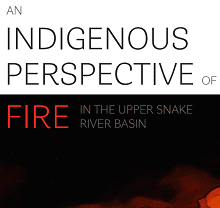Traditional Ecological Knowledge
View booklet.
The reciprocal nature of our human interactions with our natural environment can be viewed through the lens of fire management in the West by federal, state, and private land managers. A wildfire’s impact is not affected by the presence of a geopolitical boundary, it is still inherently a natural process fueled by relatively well-understood dynamics. Yet, changing climate conditions such as extended heat waves, droughts, shifts in rainfall patterns or types of precipitation are changing how fire behaves in the West. From a Tribal member’s perspective, these climatic conditions, social development, and ecological degradation are all connected events with relatively predictable consequences. Because there is a reciprocal relationship with our environment, we are collectively accountable for the consequences of our choices in a modern context through a changing climate.
Webinar recording.
This virtual webinar recording is for natural and cultural resource managers, especially from Tribal Nations in the southern United States, and others who want to learn more about the how Tribes work with fire to adapt to a changing climate. Registration is required.
Topics and speakers in the recording include:
Mark Morales, Choctaw Nation of Oklahoma and Andrew Baker, USDA Forest Service: Choctaw Nation agreements with USDA Forest Service.
Gesse Bullock, Alabama-Coushatta Tribe of Texas: Alabama-Coushatta Tribe of Texas fire crew and partnerships.
This seminar was co-hosted by the South Central Climate Adaptation Science Center, the Southeast Climate Adaptation Science Center, and the U.S. Forest Service.
View article.
Drawing insights from the Australian and Canadian contexts where governments are restoring lands and reconciling with the laws and governance of Indigenous Peoples, we illustrate how IFS interacts with the state. We do this in two ways. Figure 1 shows that the state has three general strategies for dealing with IFS: avoidance (ignoring IFS), coping strategies (carefully considering and sometimes accommodating IFS), and learning (embracing and accommodating IFS). We document that post-wildfire, there are affective drivers that move the state’s approach from avoidance to learning; however, over time, as public attention shifts away from alternatives, the strategy moves back to either avoidance or coping strategies (where the state is required to engage with IFS, but cannot fully embrace it because of institutional, tenure, or jurisdictional issues, among other constraints). Figure 2 documents the six coping strategies available to bureaucracies in dealing with IFS, which either institutionalize, partially institutionalize, or do not institutionalize IFS. Each of these pathways has implications for IFS, and the manuscript details the effects on IFS practices, and the impacts for people and landscapes.
View article.
In this article, we highlight strategies that Indigenous communities and scholars are employing to approach wildfire management. We start by introducing the reader to the colonial ecological violence that has resulted from the exclusion of fire and the ways that communities resist the settler colonial paradigm of fire suppression. We then analyze the role of militarism and incarceration within the “fire industrial complex.” Militarism and incarceration have been a part of settler colonial fire suppression in California since the beginning even as they emerge in novel forms in the twenty-first century, and they pose a challenge to regenerative and sovereign Indigenous fire futures. Next, we guide the reader through debates on Indigenous “traditional ecological knowledge” (TEK) and the ways that fire science variously erases, homogenizes, or romanticizes the epistemologically and politically complex practices of Indigenous burners. We advocate that scholars avoid participating in an extractive “TEK rush” and instead enter into direct relationships of accountability and collaboration with Indigenous fire practitioners. We conclude by discussing the ways Indigenous communities build anticolonial movements to assert sovereignty—fire and otherwise—based on reciprocal and relational systems for people and ecosystems. By reframing the current wildfire crisis through the lens of settler colonialism, we bypass unilateral, settler-driven solutions and emphasize that respect for Indigenous fire sovereignty—not only Indigenous fire knowledge—is essential for actualizing just fire futures in California and beyond.
View webinar recording.
The National CASC hosted a webinar series on how to integrate Indigenous Knowledges (IK) into Federal research and resource management programs. It ran bi-weekly from April 6 to June 1, 2023 and centers Indigenous voices to explore ethical, legal, and scientific considerations for working within different knowledge systems and provides guidance reflecting best practices.
View article.
This study expands on a 2011 tribal research needs assessment with a survey to identify tribal natural resource professionals’ research needs, access to research findings, and interest in participating in research. Information needs identified in our survey includes forest health, water quality, culturally significant species, workforce and tribal youth development, cultural importance of water, and invasive species. Additionally, postfire response and valuation, resilience and long-term forestry, protecting and curating tribal data, and Indigenous burning were more important research needs for tribal members than for nontribal members. This study can inform forestry research planning efforts and establish research priorities and collaborations that are aligned with needs identified by tribal natural resource managers.
View article.
Researchers carried out a systematic literature review involving both a global and a case study approach (Portugal) to investigate the configuration of the social dimensions of wildfires in academic literature. We advance two interlocking claims: (i) human dimensions of wildfires are often simplified into shallow indicators of anthropogenic activities lacking social and historical grounding, and (ii) fire knowledge of Indigenous peoples and/or other forest and fire users and professionals remains overlooked. These arguments were manifest from the global-scale review and were confirmed by the case study of Portugal. The individual perceptions, memories and cultural practices of forest and fire users and professionals and the historical co-developments of fires, people and forests have been missing from wildfire research. Including and highlighting those perspectives will both add to existing knowledge and inform policies related to fire management by making them socially meaningful.
View video (7:05).
For thousands of years, the vast majority of fires on the land were intentionally set by Indigenous Peoples of this region for a variety of reasons. Today, on the Flathead Reservation in Western Montana, the Division of Fire of the Confederated Salish & Kootenai Tribes’ Forestry Department is reclaiming a traditional relationship with fire on the landscape. Hear from the team about this work and how these fire dependent landscapes benefit from this holistic approach.
View article.
As an action-oriented framework articulated by Secwépemc Elder Ronald E. Ignace, “walking on two legs” seeks to bring Indigenous knowledges into balance with western scientific knowledge in service of upholding an Indigenous stewardship ethic that is embedded in Indigenous ways of relating to land and embodies principles of respect, reciprocity, and responsibility. Grounding this discussion in the context of fire-adapted ecosystems of western Canada and unceded and traditional Secwépemc territory, Secwepemcúl̓ecw, we argue that walking on two legs, along with principles of reconciliation, offers a pathway to uphold respectful relationships with Indigenous peoples, knowledges, and territories through Indigenous-led restoration.
Webinar recording.
Description: This presentation discusses a partnership between the Pyramid Lake Paiute Tribe (PLPT) in northern Nevada and a team of university-based scientists. The research team engaged PLPT stakeholder groups through workshops, interviews, and focus groups to understand how climate change and upstream pressures threaten PLPT ecosystems, lands, and resources. Stakeholders emphasized that climate change planning must be grounded in and informed by Indigenous knowledge practices and protocols, in conjunction with decolonizing approaches to climate adaptation research that returns agency to the PLPT.
Presenters: Schuyler Chew is Mohawk Wolf clan from Six Nations Grand River and grew up on the Tuscarora Nation. As an environmental scientist, he is committed to partnering with Indigenous communities on climate adaptation research. His dissertation research on the Pyramid Lake Paiute Tribe’s resilience to climate change was funded in part by the Southwest Climate Adaptation Science Center.
Karletta Chief (Diné) is an Associate Professor and Extension Specialist in the Department of Environmental Science at the University of Arizona, and is also the Director of the Indigenous Resilience Center (IRC). As an Extension Specialist, she works to bring relevant water science to Native American communities in a culturally sensitive manner, and at the IRC she aims to facilitate efforts of UArizona climate/environment researchers, faculty, staff, and students working with Native Nations to build resiliency to climate impacts and environmental challenges.





